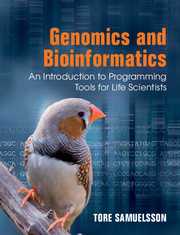Book contents
- Frontmatter
- Contents
- Preface
- Acknowledgements
- Design and conventions of this book
- 1 Introduction: working with the molecules of life in the computer
- 2 Gene technology: cutting DNA
- 3 Gene technology: knocking genes down
- 4 Gene technology: amplifying DNA
- 5 Human disease: when DNA sequences are toxic
- 6 Human disease: iron imbalance and the iron responsive element
- 7 Human disease: cancer as a result of aberrant proteins
- 8 Evolution: what makes us human?
- 9 Evolution: resolving a criminal case
- 10 Evolution: the sad case of the Tasmanian tiger
- 11 A function to every gene: termites, metagenomics and learning about the function of a sequence
- 12 A function to every gene: royal blood and order in the sequence universe
- 13 A function to every gene: a slimy molecule
- 14 Information resources: learning about flu viruses
- 15 Finding genes: going ashore at CpG islands
- 16 Finding genes: in the world of snurpsp
- 17 Finding genes: hunting for the distant RNA relatives
- 18 Personal genomes: the differences between you and me
- 19 Personal genomes: what’s in my genome?
- 20 Personal genomes: details of family genetics
- Appendix I Brief Unix reference
- Appendix II A selection of biological sequence analysis software
- Appendix III A short Perl reference
- Appendix IV A brief introduction to R
- Index
- References
20 - Personal genomes: details of family genetics
Published online by Cambridge University Press: 05 August 2012
- Frontmatter
- Contents
- Preface
- Acknowledgements
- Design and conventions of this book
- 1 Introduction: working with the molecules of life in the computer
- 2 Gene technology: cutting DNA
- 3 Gene technology: knocking genes down
- 4 Gene technology: amplifying DNA
- 5 Human disease: when DNA sequences are toxic
- 6 Human disease: iron imbalance and the iron responsive element
- 7 Human disease: cancer as a result of aberrant proteins
- 8 Evolution: what makes us human?
- 9 Evolution: resolving a criminal case
- 10 Evolution: the sad case of the Tasmanian tiger
- 11 A function to every gene: termites, metagenomics and learning about the function of a sequence
- 12 A function to every gene: royal blood and order in the sequence universe
- 13 A function to every gene: a slimy molecule
- 14 Information resources: learning about flu viruses
- 15 Finding genes: going ashore at CpG islands
- 16 Finding genes: in the world of snurpsp
- 17 Finding genes: hunting for the distant RNA relatives
- 18 Personal genomes: the differences between you and me
- 19 Personal genomes: what’s in my genome?
- 20 Personal genomes: details of family genetics
- Appendix I Brief Unix reference
- Appendix II A selection of biological sequence analysis software
- Appendix III A short Perl reference
- Appendix IV A brief introduction to R
- Index
- References
Summary
Basic principles of genetic inheritance
In this chapter we will discuss inheritance within a family and address questions about the parental origin of specific sites in a genome. First we need to understand a few basic elements of genetics. All human cells contain two copies of each chromosome, one of parental and one of maternal origin. Exceptions are the reproductive cells or gamete s, i.e. eggs in females and sperms in males, which have only one copy of each chromosome. The gametes are formed in the process of meiosis (Figs. 20.1 and 20.2). Meiosis starts out with a cell having two copies of each chromosome (one from the father and one from the mother; two such chromosomes are said to be homologous). The DNA is first copied in order to generate two copies each of the paternal and maternal chromosomes. Through crossing-over, which occurs by homologous recombination, segments are occasionally interchanged between parental and maternal chromosomes (Fig. 20.2). Such recombination occurs about 50–100 times during meiosis, and there is evidence that in humans the recombination in maternal meiosis is about 1.7 times more frequent than in paternal meiosis (Petkov et al., 2007; Roach et al., 2010).
Information
- Type
- Chapter
- Information
- Genomics and BioinformaticsAn Introduction to Programming Tools for Life Scientists, pp. 266 - 277Publisher: Cambridge University PressPrint publication year: 2012
